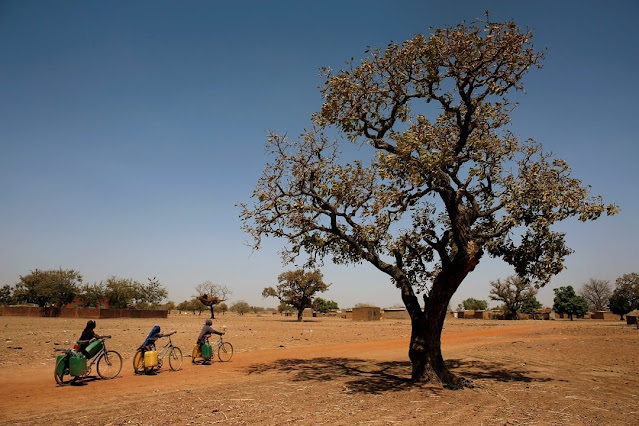Why has female participation in water management in Ghana failed?
Women in Africa hold invaluable knowledge about water and are the biggest users of water in the continent, however, they remain voiceless in decision-making processes and management of water. Women's participation has been associated with the success of water projects. Women played a significant role in decision-making before colonialism, however, during and "post" colonial periods excluded women and maintained gendered power imbalances in society.
Even though Ghana has an abundance of water availability, the country lacks adequate water access. According to UNICEF, 76% of households in Ghana drink water that is faceally contaminated. Ghana's water management has undergone a series of reforms since its independence in 1957 and has introduced a decentralised approach to water management, entailing the empowerment of local people and increased public participation. Ministry of Women and Children's Affairs (MOWAC) is the department in charge of enforcing the national gender and children's policy, which serves to address women and children's issues across all parts of society.
Women in Ghana, despite their essential role in the country's water society, face significant barriers to participation in water management. Traditional norms and practices in addition to a highly male-dominated society, pose challenges to women's participation in water management. Women's equal participation is also largely hindered by time allocation struggles, which significantly stems from their responsibility to collect water. Much like wider Africa, women in Ghana have limited rights and access to basic resources, including land ownership and access to the labour market, thus reducing their earning capacity. Ghanian women earn on average 25% less than men.
Village Agricultural Initiatives Project
The Village Agricultural Initiatives Project (VAIP) was established to generate small income-generating projects for women during the drier seasons, using primarily agricultural projects in order to strengthen the economy of the wider community. In East Mamprusi and Yendi, some of these projected included the extraction of shea butter. The principle of participation allows for women in poor village communities to gain managerial skills, allowing them to repair and manage their water sources. However, this project, like other projects aimed at female inclusion and participation in Ghana, failed. The emphasis on participation, empowerment and sustainability highlights their lack of consideration of wider structural causes of poverty and gendered power inequalities.
Water provision and poverty
There is a water tariff on drinking water in many societies, which is a part of the financial management of the water source. Women frequently face difficulties making payments due to their limited economic capital. Consequently, they continue to be restricted to water collection. Despite having relatively less financial means, women pay the water tariff, men continue to be unbothered about how their spouse acquires the means to pay and women continue to be burdened with water collection responsibilities. As women heavily rely on water collection, water projects such as the implementation of taps and boreholes, will not be as successful as anticipated because they will be unable to pay the tariffs. Women are critical in acknowledging who is poor. The UN states that water is a right, however, because some poor women cannot afford the amount of water that is required for basic sanitation and hydration needs, there should be exceptions on payments. By including women in water management, we can ensure that the right to water is achieved.
Conclusion
The central government needs to establish improved laws and legislations that actively enforce women's rights to participate in water management and other aspects of management are urgently needed. Furthermore, women should be greeted with incentives to engage in water supply management and decision-making, which would ultimately outweigh the burden that their participation entails. Implementing women's participation in water management will be difficult without the laws explicitly promoting female participation. However, gendered imbalances in Ghana in Integrated Water Resource Management are difficult to overcome regardless of laws and national plans for gendered inclusivity because the projects are underfunded.


Excellent post. I like how you both pointed out the advantages of VAIP, however you were also critical in its disadvantages. Your post allowed me to understand how engrained gender power inequalities still exist within such schemes which are ultimately aimed at increasing female participation and inclusion. There is no simple solution, however raising awareness about the gender imbalances which currently exist in integrated water resource management schemes in Ghana is a step forward!
ReplyDeleteHi Greta. I think raising awareness is definitely so important in achieving inclusive water management schemes. However, solidifying gender-mainstreaming in government policy should also be a priority to ensure participation is approached appropriately.
Delete